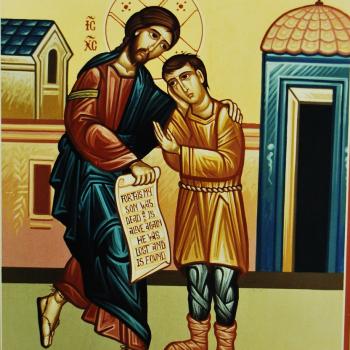On the Second Sunday of Christmas, January 2, the preacher may choose to focus on Christ as God's Creative Wisdom (John 1:1-18, expanding on the lectionary's John 1:10-18 reading) or the visit of the Magi (Matthew 2:1-12). In both cases, the scope of revelation is global. John 1:1-18 places Christ at the center of the cosmic adventure: the reality made flesh in Jesus of Nazareth reflects God's vision and action in the creation itself. The world is founded on God's wisdom and creativity, and God's ongoing creative works always aim at wholeness and salvation. John's God is defined in the Incarnation, "the word made flesh," in every moment of life as well as in Jesus of Nazareth. The light shines in everyone. Though John realistically notes that we often turn from the light, our unfaithfulness is met with divine love. The darkness cannot overcome God's light.
The story of the visit of the Magi embraces universalism, revelation, and threat. God seeks to bless all peoples in the birth of Jesus. Jesus' impact reaches beyond the Jewish tradition to embrace the whole earth. There are no God-free zones; all peoples are invited to walk in God's light. The Magi, guided by a star, are also guided by a dream. God gives them a message of warning through a dream and they go home by another road. God reveals Godself in many ways: in stillness, in dreams, in synchronous encounters, and in hunches and intuitions. The preacher can invite congregants to ponder where they have been touched by God, and invite them to awaken to God's ongoing presence in their lives. Those who seek divine guidance open themselves to ever increasing gifts of insight and revelation.
The dream, however, contains a warning. Christ is born in an ambiguous world, a world of angelic messengers, faithful foreigners, and violent rulers. This is our world today, as we seek to hold in contrast God's wonderful world with the threats we experience economically and in terms of national security. Through it all, the mood of Christmas reminds us that we must open our hearts, minds, and eyes to a guiding star that gives hope and wisdom for our times.
Christmas is a rich time for the preacher. Like the period from Palm Sunday to Easter, the preacher can focus on the many ways we can be faithful and the many challenges to our faith. The mood is celebrative, like Easter. The Christmas celebration can be lived out courageously and hopefully by those who have been touched by grief, fear, death, and anxiety, for God is with us.
Return next Wednesday for more Spiritual Practices for Preaching, from the Patheos Preachers Portal.





